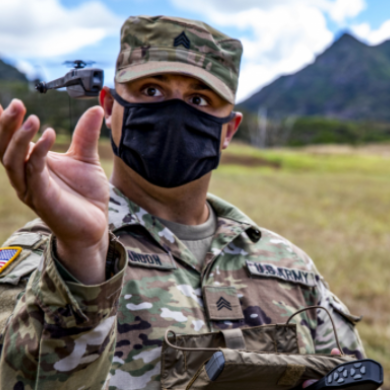The Air Force's new investment strategy is designed to "catalyze the commercial market by bringing our military market to bear," says Roper.
By THERESA HITCHENS
PENTAGON: The Air Force will roll out the final stage in its commercial startup investment strategy during the March 13-20 South By Southwest music festival, granting one or more contracts worth at least $10 million to startups with game-changing technologies, service acquisition chief Will Roper says.
The first-of-its kind event in Austin, called the Air Force Pitch Bowl, will match Air Force investment with private venture capital funds on a one to two ratio, according to a presentation by Capt. Chris Benson of AFWERX at the Strategic Institute's Dec. 4-5 “AcquisitionX” meeting. So, if the Air Force investment fund, called Air Force Ventures, puts in $20 million, the private capital match would be $40 million.
AFWERX, the Air Force's innovation unit, has one of its hubs in Austin.
“This has been a year in the making now, trying to make our investment arm, the Air Force Ventures, act like an investor, even if it's a government entity,” Roper explained. “We don't invest like a private investor — we don't own equity — we're just putting companies on contract. But for early stage companies, that contract acts a lot like an investor.”
The goal is to help steer private resources toward new technologies that will benefit both US consumers and national security to stay ahead of China's rapid tech growth, Roper told reporters here Friday.
The Air Force wants to “catalyze the commercial market by bringing our military market to bear,” he said. “We're going to be part of the global tech ecosystem.”
Figuring out how to harness the commercial marketplace is critical, Roper explained, because DoD dollars make up a dwindling percentage of the capital investment in US research and development. This is despite DoD's 2021 budget request for research, development, test and evaluation (RDT&E) of $106.6 billion being “the largest in its history,” according to Pentagon budget rollout materials. The Air Force's share is set at $37.3 billion, $10.3 billion of which is slated for Space Force programs.
“We are 20 percent of the R&D is this country — that's where the military is today,” Roper said. “So if we don't start thinking of ourselves as part of a global ecosystem, looking to influence trends, investing in technologies that could be dual-use — well, 20 percent is not going to compete with China long-term, with a nationalized industrial base that can pick national winners.”
The process for interested startups to compete for funds has three steps, Roper explained, beginning with the Air Force “placing a thousand, $50K bets per year that are open.” That is, any company can put forward its ideas to the service in general instead of there being a certain program office in mind. “We'll get you in the door,” Roper said, “we'll provide the accelerator functions that connect you with a customer.
“Pitch days” are the second step, he said. Companies chosen to be groomed in the first round make a rapid-fire sales pitch to potential Air Force entities — such as Space and Missile Systems Center and Air Force Research Laboratory — that can provide funding, as well as to venture capitalists partnering with the Air Force.
As Breaking D broke in October, part of the new acquisition strategy is luring in private capital firms and individual investors to match Air Force funding in commercial startups as a way to to bridge the ‘valley of death' and rapidly scale up capability.
The service has been experimenting with ‘pitch days' across the country over the last year, such as the Space Pitch Days held in San Francisco in November when the service handed out $22.5 million to 30 companies over two days. Roper said he intends to make “maybe 300 of those awards per year,” with the research contracts ranging from $1 million to $3 million a piece and “where program dollars get matched by our investment dollars.”
The final piece of the strategy, Roper explained, is picking out the start-ups that can successfully field game-changing technologies.
“The thing that we're working on now is the big bets, the 30 to 40 big ideas, disruptive ideas that can change our mission and hopefully change the world,” Roper said. “We're looking for those types of companies.”
The Air Force on Oct. 16 issued its first call for firms to compete for these larger SBIR contracts under a new type of solicitation, called a “commercial solutions opening.” The call went to companies already holding Phase II Small Business Innovation Research (SBIR) awards. The winners will be announced in Austin.
If the strategy is successful, Roper said, the chosen firms will thrive and become profitable dual-use firms focused primarily on the commercial market.
“The, we're starting to build a different kind of industry base,” Roper enthused. “So, we've gotta get the big bets right. Then most importantly, if you succeed in one of the big bets, then we need to put you on contract on the other side, or else the whole thing is bunk.”
https://breakingdefense.com/2020/02/air-force-to-pump-new-tech-startups-with-10m-awards


